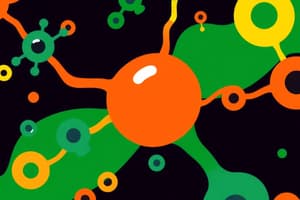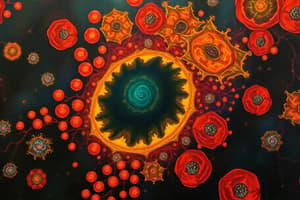Podcast
Questions and Answers
What do organic molecules describe?
What do organic molecules describe?
- Compounds that contain oxygen
- Compounds that contain hydrogen
- Compounds that contain nitrogen
- Compounds that contain carbon (correct)
What serves as the primary source of cellular food?
What serves as the primary source of cellular food?
Carbohydrates
What are the building blocks of carbohydrates?
What are the building blocks of carbohydrates?
Monosaccharides
What provides structure and serves as enzymes?
What provides structure and serves as enzymes?
What are the building blocks of proteins?
What are the building blocks of proteins?
What do nucleic acids store?
What do nucleic acids store?
What are the building blocks of nucleic acids?
What are the building blocks of nucleic acids?
What do lipids store and serve as?
What do lipids store and serve as?
What are the building blocks of lipids?
What are the building blocks of lipids?
Flashcards are hidden until you start studying
Study Notes
Organic Molecules
- Comprise a broad category of compounds containing carbon as a fundamental element.
Carbohydrates
- Act as the primary energy source for cells, essential for cellular functions.
Monosaccharides
- Serve as the fundamental building blocks of carbohydrates; examples include glucose and fructose.
Proteins
- Essential for structural support and function as enzymes, facilitating biochemical reactions.
Amino Acids
- The basic units or building blocks of proteins, typically composed of a central carbon, amino group, carboxylic acid group, and side chain.
Nucleic Acids
- Fundamental molecules responsible for storing and transmitting genetic information within a cell; includes DNA and RNA.
Nucleotides
- The basic structural units of nucleic acids, composed of a nitrogenous base, a sugar, and a phosphate group.
Lipids
- Function in energy storage, act as hormones (steroids), and constitute a significant portion of cellular membranes.
Glycerol and Fatty Acids
- The primary building blocks of lipids, where glycerol forms the backbone and fatty acids contribute to the overall structure.
Studying That Suits You
Use AI to generate personalized quizzes and flashcards to suit your learning preferences.




